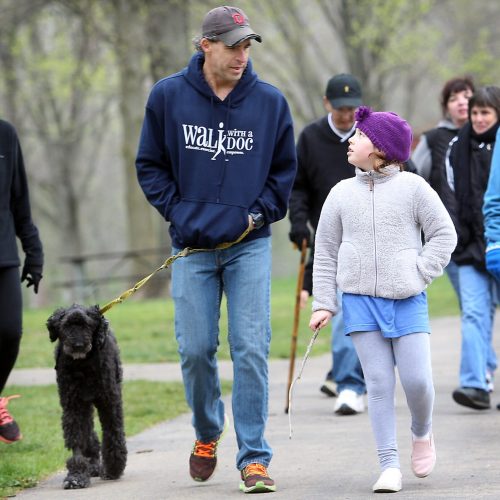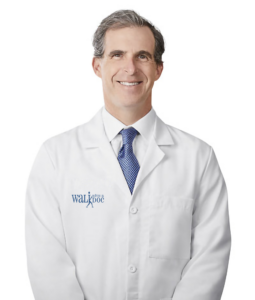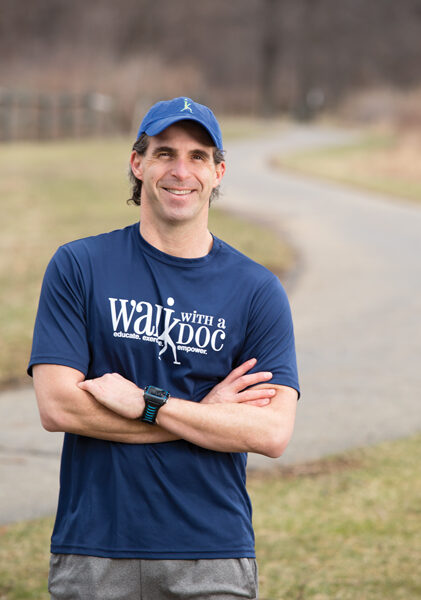Walk With A Doc’s Founder: “You have to walk the talk”

Interview by Ed Ryan
In 2005, Dr. David Sabgir, a cardiologist in Columbus, Ohio, realized encouraging people to walk as part of their cardiac rehabilitation was a first step that often went nowhere. Words from your doctor in an office often sound helpful and sensible, but those words don’t always lead to change.
Dr. Sabgir decided to become the change by inviting his patients to walk with him on Saturday mornings. The informal walking club was surprisingly popular and over time, getting outside and taking a walk with a clinician became a grassroots movement. Today, that movement is called Walk with a Doc and has over 500 chapters worldwide.
We recently chatted with Dr. Sabgir, Walk with a Doc’s Founder, about the importance of walking, the benefits of social connection, why he still holds weekly walks, and more.
Where did you grow up?
Some might argue that I haven’t. I grew up in Worthington, Ohio and now live in New Albany, Ohio. Both are suburbs of Columbus.
The story of how you founded Walk with a Doc is well-chronicled, and Walk with a Doc now has more than 500 chapters worldwide. When you think back 20 years to just getting started, what are you most proud of?
Viscerally, I’m most proud of Rachael Habash (Walk with a Doc’s Chief Operating Officer) and Bryan Romey (Walk with a Doc’s Program Manager), the most heart-warming people who care deeply about making a difference and turning these epidemics of sedentary lifestyles and loneliness around. I’m also deeply proud of the thousands of volunteers and volunteer healthcare providers that want to connect and spend time with their communities. These physicians are empathetic leaders who are creating wonderful communities within their respective neighborhoods.
What are you most grateful for?
Within Walk with a Doc, I’m most grateful for all the volunteers who make this thing hum. It is a special feeling to share such similar feelings with others around the globe.
You still host weekly walks on Saturday mornings in the Columbus area. Why do you still do it?
A million reasons, but primarily the friendships that are quickly established. I also invite my patients and I don’t want them to show up and not have me there. You have to walk the talk, right?
Why should people go to the Walk with a Doc website and join a Walk with a Doc walk? What will they get out of it?
Thank you. They will get a rather immediate sense of community and connection, a significant reduction in heart disease risk, cancer risk, along with the risk of dozens of other different diseases like dementia, arthritis, depression – just a ton of them. Most of our walks are in nature when possible and that is also a powerful tool for our health. I swear if everyone went for one of these fun walks outside with the friends they will meet? Hospitals would be a fraction of the size. This is the Swiss Army Knife of healthcare.
Is there a story about a particular walker who, through Walk with a Doc, improved their health significantly through walking, or perhaps they were given medical advice on the walk that ultimately improved their health?
We have a ton of them! From around the country! It’s hard to call out just one, but many are documented nicely on our website (Walk with a Doc stories).

Through Walk with a Doc, what lessons have you learned about the importance of social connection?
Another great question. You could see the power of it early on, anecdotally. People yearn to be with each other. This, of course, accelerated immediately after the pandemic when a lot of walker guests spoke about getting their ‘second circle’ back after missing them so much. Finally, there is now a growing abundance of health outcomes data showing how powerful our social connections are. It is exciting to see social prescribing growing as a global movement.
Walk with a Doc naturally brings people together in a social setting. How important is maintaining social connection, particularly for older adults?
It is critical for both our physical and mental health. Physically, those with social connections have a lower risk of chronic illnesses. Mentally, we have higher happiness levels and lower depression when we’re in strong social relationships.
Other than walking, what is your favorite group activity or club?
I love running and cycling with friends. I also love reading, and I’m trying to make up for many missed years of that.
Please tell us about your immediate family.
My wife, Kristin, is a lawyer by training but is now back in school to pursue her dream job, becoming a librarian. Our daughter, Ally, just wrapped up her first year of medical school in the beautiful city of Madison, Wisconsin. Her younger brother, Charlie, recently graduated from college in Washington, D.C.
Do you have any trips planned with your family or friends this year?
Thank you. It is a very fortunate year for you to ask that question. We’re letting it fly this year. Kristin, Ally, Charlie and I are hiking the first half of Coast to Coast in England’s Lake District this July. In November, Kristin and I are going to Vietnam for two weeks with two other couples.
Back to your love of reading. Is there a book you would recommend?
It is hard for me to limit book recommendations but three blew me away: The Heaven and Earth Grocery Store by James McBride, How the Word is Passed by Clint Smith, and How to Know a Person by David Brooks. Okay, I have to include a fourth: Outlive by Dr. Peter Attia and Bill Gifford.
